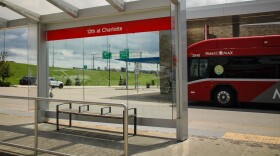-
The money will help Kansas City pay for police overtime, buy more cruisers and put ambassadors on public transit ahead of this summer's World Cup. Kansas City will host six matches, and the metro will be the base camp for four teams.
-
The Kansas City Area Transportation Authority will charge for bus rides starting in June. The $2 fare can be paid through an app, credit or debit card, or reloadable fare cards.
-
Around 80% of bus stops across the metro do not have somewhere for riders to sit. Even fewer have a shelter. An interactive map from KCUR shows where to find amenities at each bus stop in the metro, and what the area transit agencies are doing to add more.
-
The city is giving the Kansas City Area Transportation Authority an additional $13 million as part of a contract agreed on in August. But the KCATA still plans to cut two bus lines and limit hours on more than a dozen others.
-
Kansas City’s transit agency is getting rid of its CEO after years of budget problems and route cutsFrank White III has led the Kansas City Area Transportation Authority since 2022. The KCATA board decided to not renew his contract amid high tensions between the agency and Kansas City, and a looming fiscal cliff that has threatened service cuts multiple times this year.
-
Johnson County commissioners unanimously approved the county's first ever strategic plan for bus, micro transit and paratransit services. It recommends focusing on increasing frequency of buses along a few key routes, reinstating bus fares and rebranding as "Ride JoCo."
-
About 75% of Kansas City bus stops don't have anywhere to sit while you wait, and the Kansas City Area Transportation Authority keeps removing benches despite complaints from riders. Sunrise Movement KC is taking things into their own hands, but their makeshift seats may be removed as quickly as they're assembled.
-
"Free buses" is one of the big ideas that helped Zohran Mamdani win the Democratic mayoral primary in New York City. But in Kansas City, the bus system is going the opposite direction after years of free fares — mostly because of a lack of transit funding.
-
The Kansas City transit agency has installed narrow "leaning benches" at busy bus stops downtown and touted them as an accessible amenity. But riders and experts disagree and say they’re made to make people uncomfortable.
-
Kansas City's options for dazzling, and free, fireworks shows on July 4 include the Stars and Stripes Picnic at the National World War I Museum and Memorial. But you'll find even more festivities throughout the metro, and across the whole holiday weekend.
-
The Kansas City Royals need to get moving if the team wants a new stadium by 2031. Decision makers in Jackson County, Clay County and North Kansas City do not want to repeat the mistake of working out details after it’s been placed on a ballot.
-
The group planning Kansas City’s matches hopes to build a regional transit network that gets residents and hundreds of thousands of visitors across the metro quickly and easily. They’ll need more money and regional cooperation to do so.
Play Live Radio
Next Up:
0:00
0:00
Available On Air Stations












